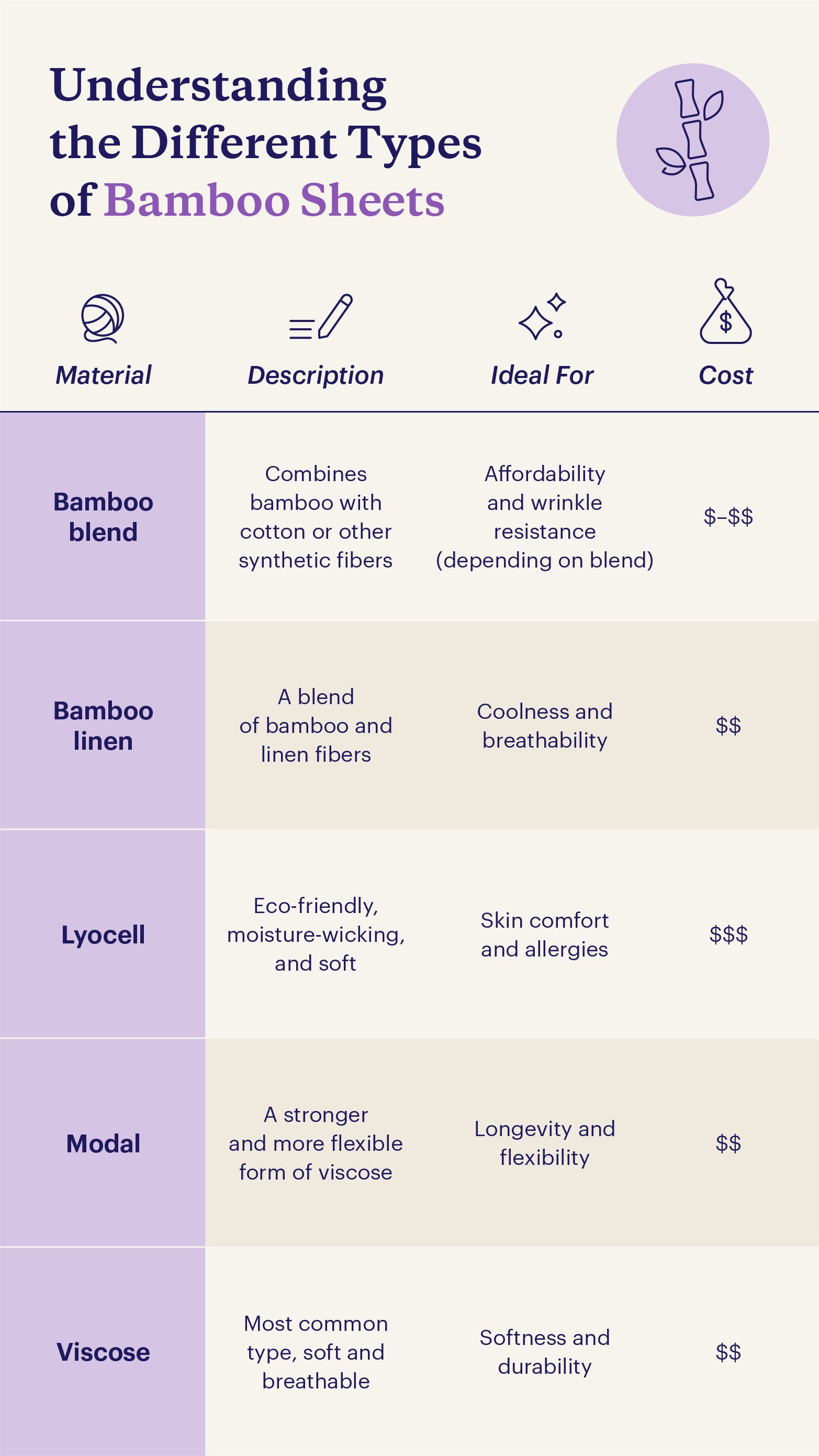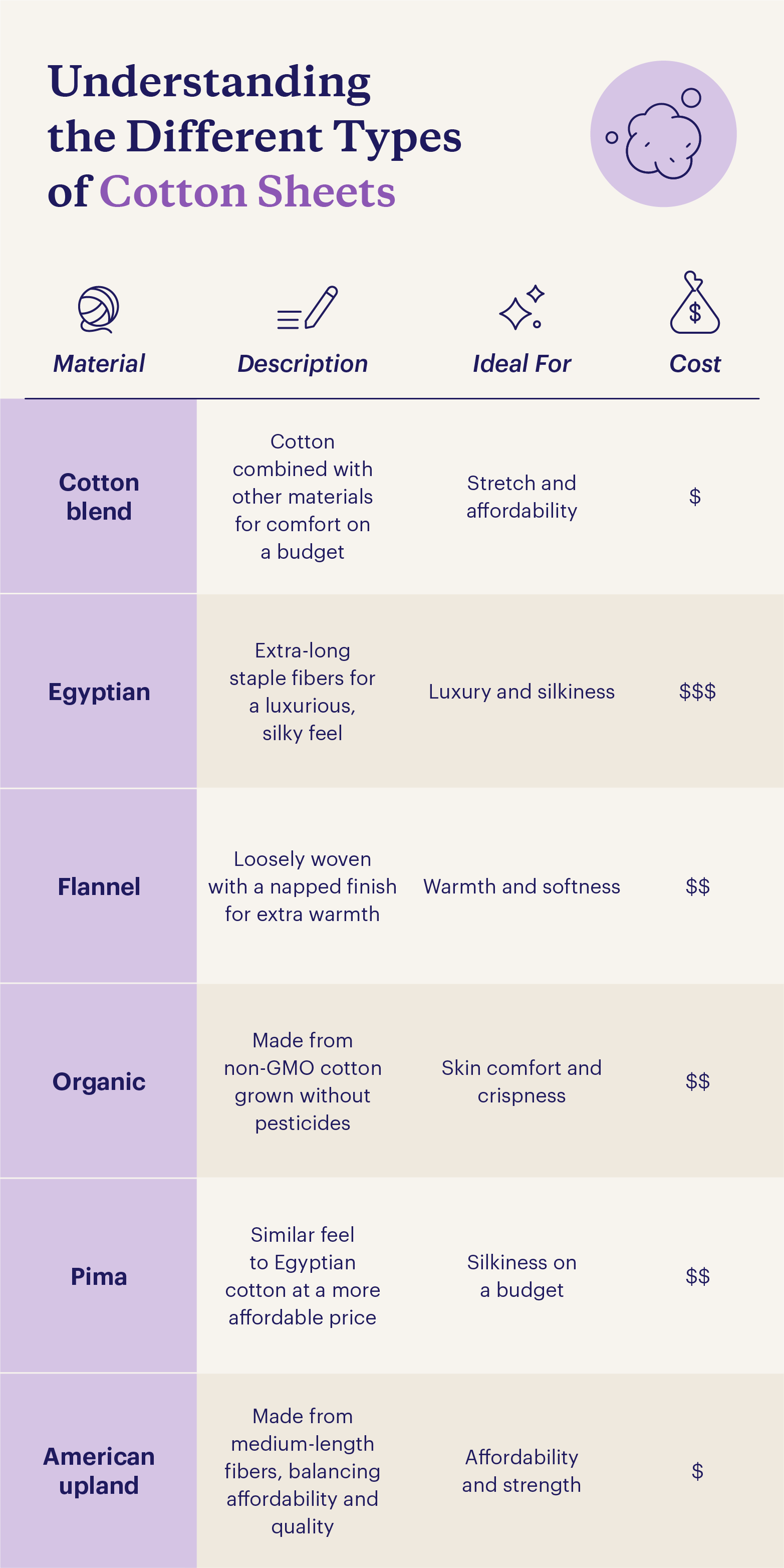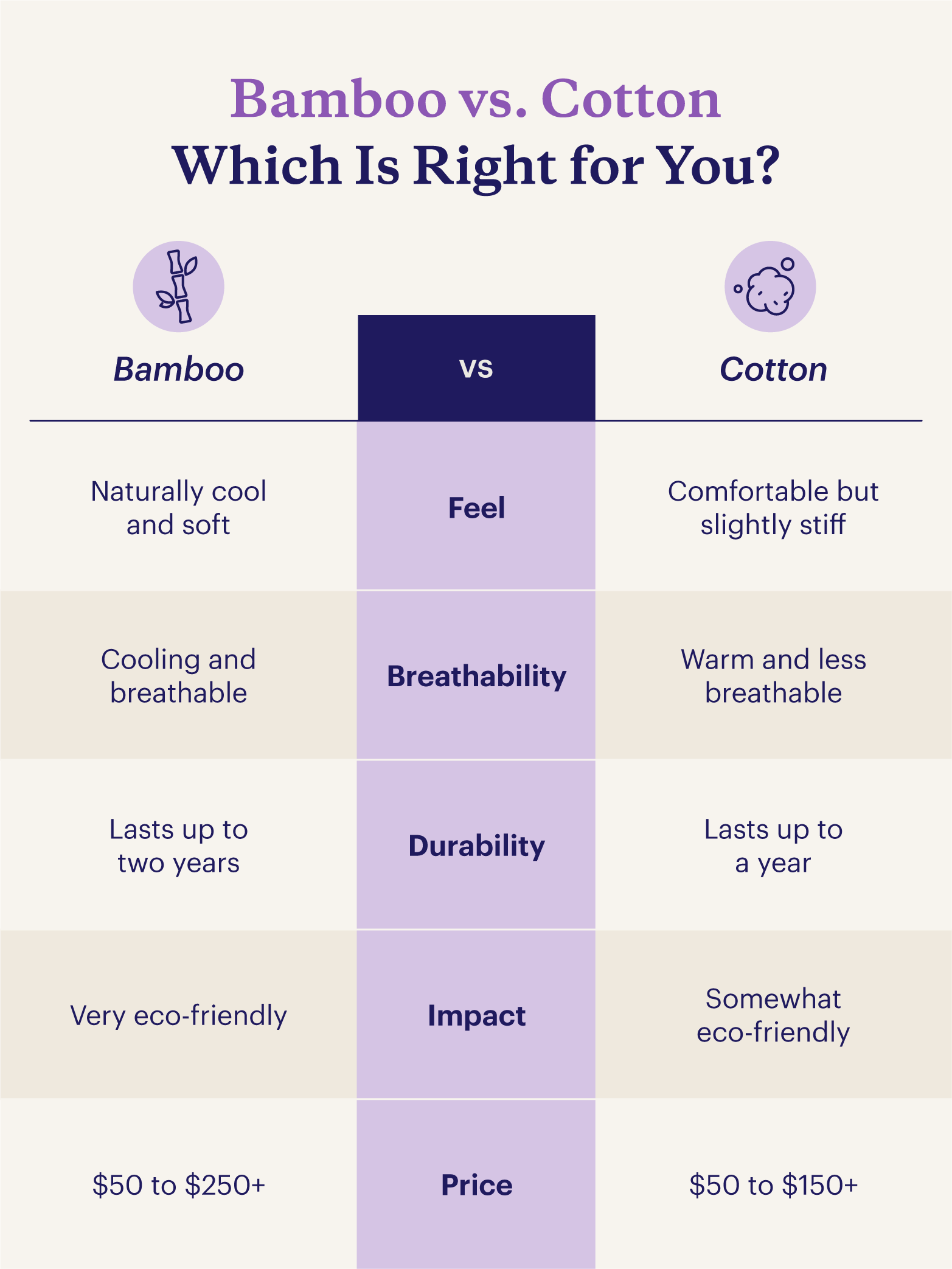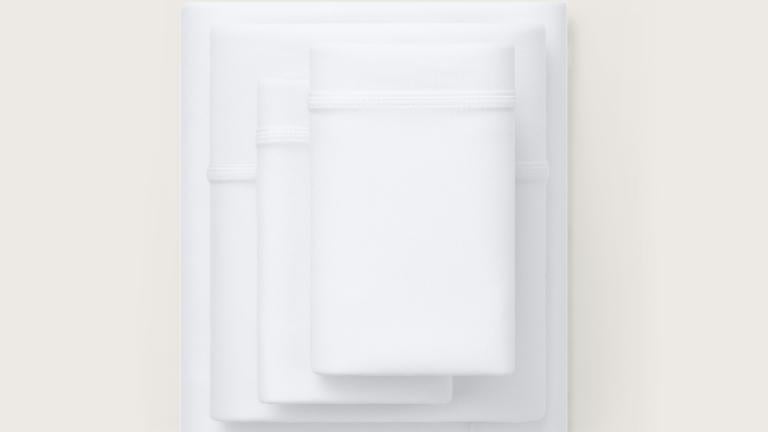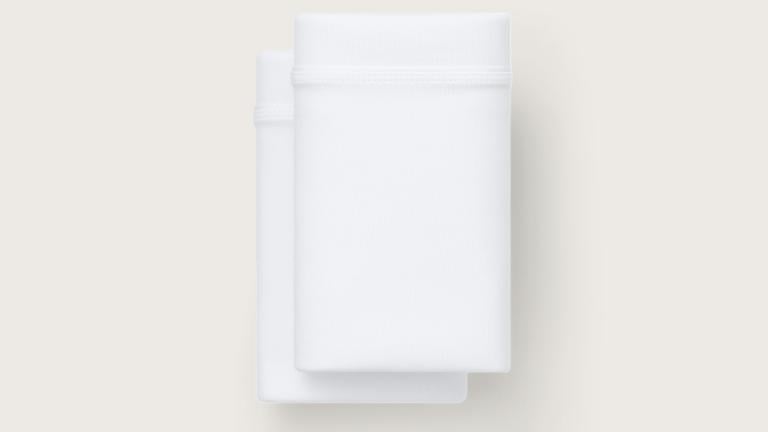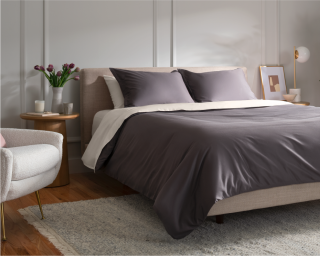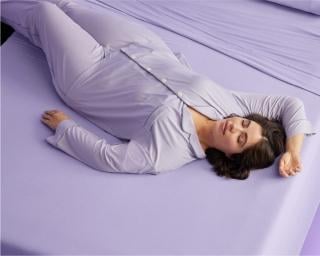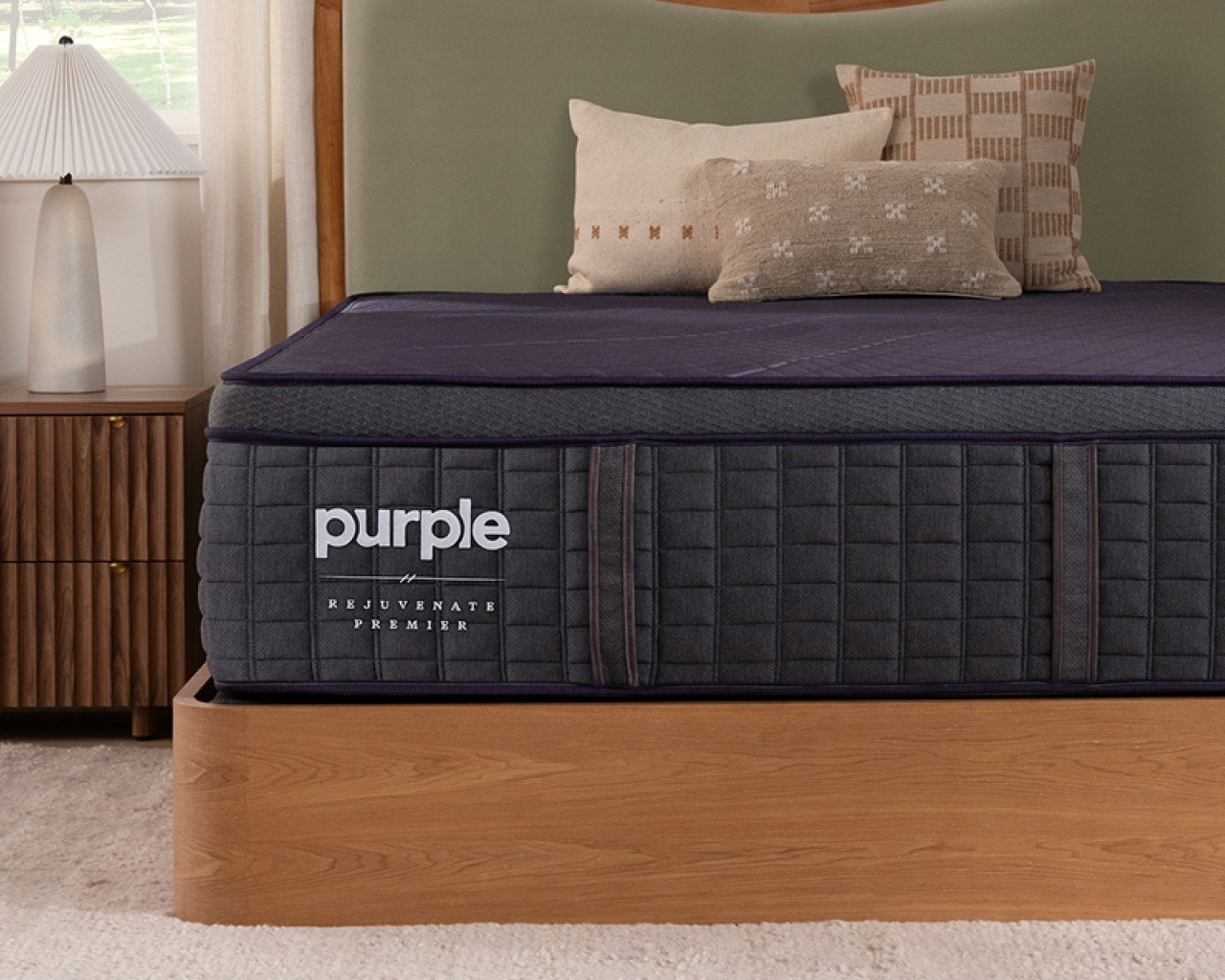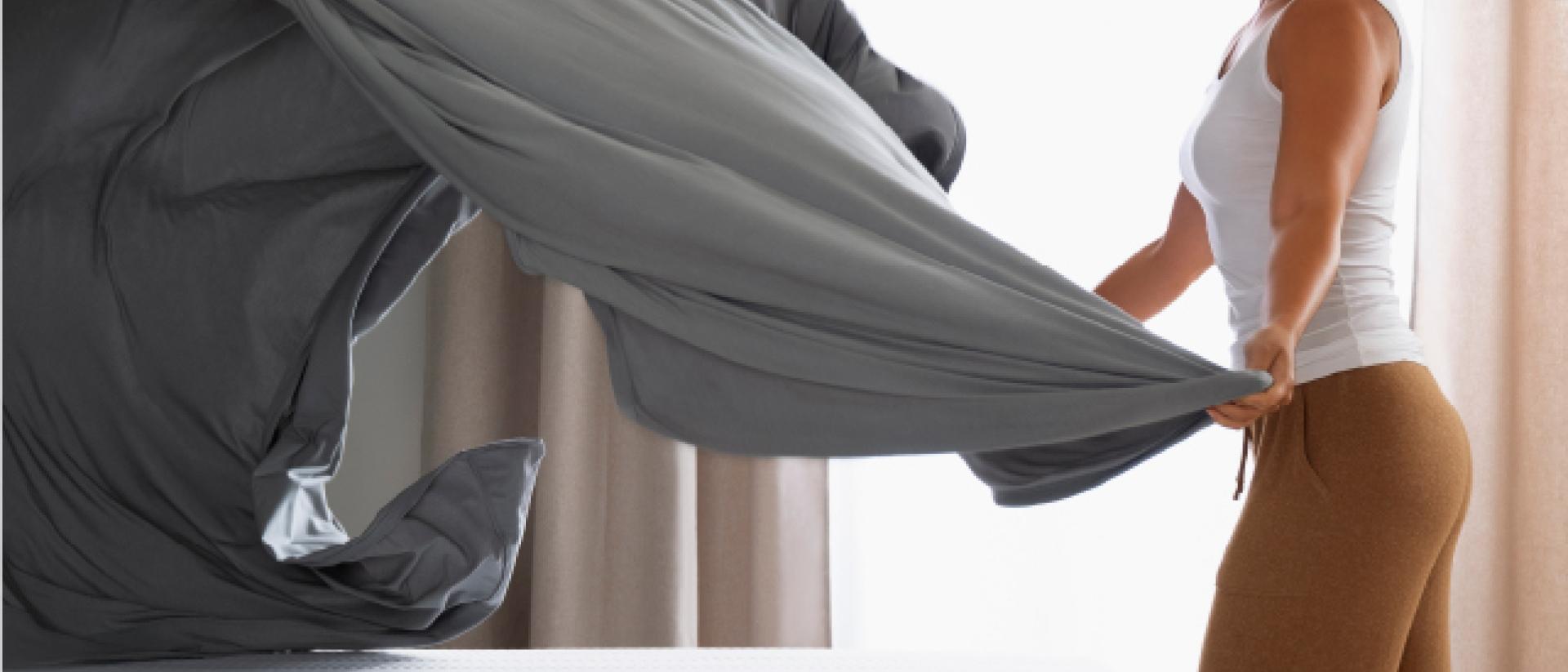
Bamboo vs. Cotton Sheets: Differences + How To Choose
Key Takeaways
- Bamboo sheets offer cooling benefits, hypoallergenic properties, and a luxuriously buttery feel, making them a good fit for those who run warm and are willing to spend more for softer sheets.
- Cotton sheets keep you extra warm and offer a comfortable feel that softens over time, making them a good fit if you’re looking for a more affordable, crisp sheet set.
- Both bamboo and cotton sheets are great options but are made with different types of high-quality materials that offer their own unique benefits.
Sheets made of bamboo? It might seem like fiction, but it’s true — bamboo sheets are some of the softest, most comfortable, and most durable sheets you’ll ever sleep on. But if you currently have cotton sheets, you might be wondering what the difference is between bamboo and cotton sheets.
In recent years, bamboo bed sheets have become a popular, eco-friendly alternative to luxury fabrics for duvet covers, pillowcases, and bed sheets.
In this guide, we’ll cover the pros and cons of bamboo and cotton so you know how to buy sheets that are right for your unique needs.
What Are Bamboo Sheets?
Bamboo sheets are woven with thread from spun bamboo fiber. They’re generally softer and more durable than other types of sheets like cotton, giving them a more luxurious feel. And because natural bamboo is hypoallergenic and offers thermoregulating properties, bamboo sheets are great for almost any type of sleeper — whether you’re a hot sleeper or struggle with nighttime sniffles.
Bamboo sheets come in five different types: viscose, modal, lyocell, bamboo linen, and bamboo blend. Purple SoftStretch® sheets come in many bed sizes, from small sheet sizes to king sizes, to perfectly adapt to your mattress for a silky smooth, one-of-a-kind, moisture-wicking feel.
Types of Bamboo Sheets
Most people choose their bed sheets based on look and feel. But you might be surprised to learn that the type of material you choose can actually help ward off allergens and keep you cooler at night.
Bamboo bed sheets are some of the best sheets for allergies because they help reduce moisture and, therefore, dust mites. But not all bamboo sheets are made of the same materials, which means they offer their own unique benefits. That said, most bamboo sheets you come across are made with viscose from bamboo, which is a versatile, regenerated cellulose fiber.
Let’s look at the different types of bamboo sheets and what they’re made of:
- Bamboo blend: Sheets made with a bamboo blend are usually made with bamboo fiber and a cheaper fabric, like polyester. They’re not as soft, but they’re often more affordable and durable.
- Bamboo linen: Bamboo linen sheets (aka bast bamboo fiber) are made from a blend of bamboo and linen fibers. Much like cotton linen, bamboo linen is known for wrinkling easily and isn’t as soft and silky. Still, it’s good for keeping cool and comfortable all night in hot environments.
- Lyocell: Bamboo lyocell fabric is made from bamboo pulp. It’s considered the most eco-friendly type of bamboo sheet because its manufacturing process usually doesn’t involve chemicals.
- Modal: Bamboo modal sheets are made from bamboo viscose. These sheets go through the same process as viscose sheets but with an added step that stretches the fabric for added flexibility.
- Viscose: Bamboo viscose sheets are made of regenerated cellulose fibers and are the most common type of bamboo sheets. The viscose process uses chemicals to create a pulp which is then made into thread. Rayon is another term for regenerated cellulose (viscose) that you might see on labels.
Just like the materials used affect the look and feel of bamboo sheets, so do the weave patterns. Here are the most common types of weaves used in bamboo sheets:
- Sateen: The most common type of weave used in bamboo sheets is sateen, which consists of one thread under and three or four threads over. It has a soft, silky feel and is wrinkle-resistant, though it’s more prone to pilling and retaining heat.
- Percale: The percale weave comprises one thread over and one thread under. This type of weave produces a lightweight, matte fabric. Bamboo sheets with the percale weave have the best breathability, making them perfect for hot climates. That said, the percale weave is more prone to wrinkling.
- Twill: The twill weave has a diagonal parallel rib pattern — the same one used in denim. The ribbing increases durability, so bamboo sheets using a twill weave are typically the strongest and wrinkle the least. However, they are not the softest because the twill weave has more texture.
Pros and Cons of Bamboo Bed Sheets
It might seem like a no-brainer to buy bamboo sheets, but there are a few downsides to consider as well — namely that they typically cost more than cotton sheets. But if you need to replace your sheets, bamboo might be the right choice.
Let’s look at the pros and cons of bamboo sheets.
Pros | Cons |
Thermoregulating to keep you cool all night long | Some sheet weaves are prone to wrinkling |
Softness is comparable to expensive cotton sheets | Can be more expensive than synthetic or cotton sheets. |
Hypoallergenic to reduce nighttime sniffles | Some types undergo chemical processing |
Anti-bacterial and stain-resistant for cleanliness | |
More sustainable and eco-friendly than synthetic fabrics |
What Are Cotton Sheets?
Cotton sheets are made from the fibers of the cotton plant, known for its crisp, durable feel. These qualities are why clothes are made of cotton, too — in fact, you probably have more than a few cozy cotton garments in your closet right now.
Cotton absorbs moisture unlike bamboo, so cotton sheets won’t offer the same hypoallergenic or cooling effects as bamboo. They typically come in six different types: organic, Egyptian, cotton blend, flannel, Pima, and American upland.
Types of Cotton Sheets
Cotton is cotton, right? Not quite. Thread lengths and texture influence how cotton sheets look and feel. When it comes to choosing a type of bed sheet, you’ll want to make sure your sheets fit your sleep style for maximum comfort.
Most types of cotton sheets offer more warmth, so they’re perfect for cooler climates and those who run cold at night.
Here are the different types of popular cotton sheets and how they’re made:
- Cotton blend: Cotton is sometimes blended with spandex to increase flexibility or synthetic fibers like polyester to reduce costs.
- Egyptian: Egyptian cotton sheets have a reputation for being luxurious — and for good reason. Egyptian cotton sheets are made from extra-long cotton fibers and are typically offered in high thread counts that give it that silky, high-quality feel.
- Flannel: During cold months, many turn to flannel sheets for extra warmth. Flannel cotton sheets are made with loose weaves and go through a process called “napping” to create that fuzzy texture you know and love.
- Organic: Organic cotton sheets are sourced from non-GMO cotton grown without pesticides. If you suffer from sensitive skin, opting for organic cotton may help prevent irritation.
- Pima: Egyptian cotton sheets feel amazing, but they have a high price tag. Pima sheets offer a similar feel as Egyptian cotton sheets but are sourced from cotton grown in the U.S. for a more affordable price. You can also opt for Supima cotton to ensure the highest quality standards.
- American upland: Upland cotton sheets offer the perfect mix of affordability and quality. Made from cotton grown in the U.S., American upland cotton sheets are woven with short-length fibers for the best of both worlds.
Pros and Cons of Cotton Sheets
Cotton sheets are durable, comfortable, and affordable. But are there any downsides? Because cotton retains heat, cotton sheets can be on the warmer side — which isn’t ideal if you run hot or struggle with night sweats. Cotton is also prone to shrinking and lint buildup. Yet, many people love cotton sheets because of their crisp feel that softens with each use.
Pros | Cons |
Often more affordable than bamboo sheets | May shrink slightly if dried at a high temperature |
Can provide extra warmth in cold climates | Flannel and cotton blends are prone to pilling and lint buildup |
Some types are less prone to wrinkles and creasing | More prone to stains since they absorb moisture |
Organic cotton sheets are more eco-friendly than standard cotton | May be too warm for hot sleepers |
Bamboo Sheets vs. Cotton: How To Choose
While cotton has long been the go-to for many people when it comes to bed sheets, bamboo sheets have become extremely popular in recent years. When choosing the right sheets, it’s important to weigh your preferences — from considering thread count to how long they’ll last based on how often you wash your sheets.
So, which fabric is better? Let’s discuss bamboo vs. cotton and take a look at which one gives you the best night’s sleep.
Feel
Bamboo: The fibers in bamboo materials are typically considered softer to the touch than those in cotton. The majority of bamboo bed sheets will be far softer than regular cotton sheets, and feel buttery against your skin.
Cotton: Cotton sheets are usually crisper when you first buy them, but they get softer with use. If you want softness comparable to bamboo sheets, you’ll want to opt for Egyptian cotton, which costs more than standard cotton sheets.
Breathability
Bamboo: Bamboo sheets are naturally breathable, allowing your body to regulate temperature while feeling gloriously soft. They’re also thermoregulating to keep you cool at night, making them some of the best cooling sheets that actually work.
Cotton: Cotton sheets retain more heat than bamboo fabric since it’s not as breathable and the weave is stiffer, though they’re more breathable than other synthetic fabrics like polyester.
You may prefer bamboo sheets if you: | You may prefer cotton sheets if you: |
Live in a warm climate or run hot | Live in a cool climate |
Prefer sheets that feel buttery soft | Prefer crisp, soft sheets |
Durability
Bamboo: A set of bamboo sheets can last up to a couple of years. The stretching qualities and strength of bamboo fibers mean that they don’t tear or fall apart easily.
Cotton: Cotton sheets last a year, though higher thread counts could last longer. Cotton sheets are typically made with short to medium fibers woven together, so they tear and pill more easily. More expensive cotton sheets, like Egyptian cotton, can last for up to a few years with proper care.
Care
Bamboo: Sheets made from bamboo are sensitive to chemicals and heat. Caring for them requires washing them separately, using very mild cleaning products, and leaving them out to air dry. Bamboo linen is prone to wrinkling so more care may be required.
Cotton: Standard cotton sheets should be washed separately in warm water and hung out to dry. If you’re using expensive cotton sheets, like Egyptian cotton, they require similar care to bamboo sheets.
Environmental Impact
Bamboo: Bamboo sheets are generally environmentally friendly, though it depends on the bamboo they’re sourced from. Bamboo sheets are typically harvested from natural bamboo that is self-regenerating (meaning it resprouts new stems) to offset the environmental impact. Bamboo also requires far less water to grow than cotton (12 gallons vs. up to 200 times that).
Cotton: Cotton sheets are also considered environmentally friendly, but not to the extent of bamboo. Organic cotton sheets are more sustainable than standard options, as the cotton is harvested without pesticides that could otherwise degrade soil, pollute water, and harm wildlife.
Hypoallergenic Properties
Bamboo: Bamboo sheets are some of the most hypoallergenic available. Bamboo is antibacterial and reduces moisture buildup, which wards off dust mites — a common cause of allergies.
Cotton: While hypoallergenic to some extent, cotton sheets won’t be as good for allergies as bamboo sheets. This is because cotton absorbs some moisture, which won’t prevent dust mites as well.
Thread Count
Bamboo: Bamboo sheet thread counts usually range between 250 and 500. But high thread count for sheets isn't the only marker of quality. Because bamboo sheets are naturally softer, lower thread counts feel more luxurious than the same thread count of cotton.
Cotton: The ideal thread count for cotton sheets is between 300 and 600. For more expensive materials, like Egyptian cotton, 200-700 is ideal.
Price
Bamboo: Bamboo sheet prices range from about $50 to around $250+. They tend to cost more than cotton sheets but will last up to eight years longer with proper care.
Cotton: Standard cotton sheet prices start at under $50 and go up to $150. But, for high-end, luxury sheets like Egyptian cotton, you could be looking at a price tag of over $500.
Are Bamboo Sheets Good or Is Cotton Better?
So what’s the bottom line when comparing bamboo vs. cotton sheets? Both bamboo and cotton sheets are great options, but they offer different qualities — the choice is up to your preferences and how important cooling bed sheets are to you.
While bamboo sheets are better for those who run warm and struggle with allergies, cotton sheets offer a more affordable, cozier option. You might even decide to use both during different times of the year.
Bamboo sheets are typically more durable, are antibacterial, offer cooling properties, and wick away moisture for breathability. On the other hand, cotton sheets offer extra warmth for a soft, comfortable feel.
When it comes to your own comfort, only you can be the judge of what feels better between bamboo or cotton. Purple offers cooling bamboo sheets and crisp cotton sheets to fit your needs.
FAQ
Bamboo sheets are made from the pulp of bamboo fibers, which are spun into a fabric. Some types of bamboo sheets, like bamboo blends, are made with additional materials like spandex or polyester. Bamboo sheets come in five different types: viscose, modal, lyocell, bamboo linen, and bamboo blend.
Bamboo fabric is considered eco-friendly because it often has a lower carbon footprint than other fabrics like cotton, but its sustainability largely depends on the manufacturing process.
- Manufacturing bamboo fabric, overall, shows a smaller environmental impact and produces a lower carbon footprint (i.e., releases less carbon dioxide) than standard cotton fabric.
- Bamboo is naturally pesticide-resistant, so no chemical pesticides are needed to grow it.
- Natural bamboo is one of the fastest-growing resources on the planet. Harvesting it for sheets presents no measurable environmental threat. Even when harvested, bamboo doesn’t have to be replanted because its wide root network continuously sprouts new stems.
- Bamboo plants typically use about 12 gallons of water to make 1 pound of fabric while cotton plants can require up to 200 times more water.
Yes, bamboo sheets are hypoallergenic because they reduce moisture buildup and are typically made with bamboo grown without pesticides or fertilizers.
- Natural bamboo is resistant to fungi and pests so it can be grown without pesticides or fertilizers.
- Regenerated bamboo fabric is antibacterial because it inhibits the growth of bacteria.
- Bamboo reduces moisture buildup. Dust mites — one cause of allergies — love moist environments. Reducing moisture in your bed makes it hard for dust mites to collect.
Yes, bamboo sheets are some of the softest sheets available and feel almost buttery on the skin. This is because bamboo fibers are naturally soft. They feel smoother and more silk-like than most cotton sheets.
Yes, bamboo sheets are thermoregulating, which means they help keep you cool at night and are breathable. Bamboo typically stays a few degrees cooler than cotton, making bamboo sheets great for hot sleepers or those who suffer from night sweats.
More To Explore
Level up your sleep routine with our most-loved products.


